Performance Management: Role of Goals, Strategies, and Strategic Plans
VerifiedAdded on 2020/04/21
|6
|1093
|51
Report
AI Summary
This report delves into the critical aspects of performance management within an organizational context. It begins by examining the role of mission, goals, values, and strategies in the performance management process, emphasizing the necessity of aligning business strategies with objectives to ensure efficiency and effectiveness. The report highlights the impact of these factors on performance management, illustrating how goals and missions influence strategies and employee performance. Furthermore, it explores the influence of strategic plans on performance management, underscoring the importance of strategic planning in defining key business indicators and driving performance. The report uses real-world examples to support its arguments, offering insights into how performance management systems are structured and how they contribute to overall business success. The report concludes by emphasizing the significance of integrating strategic planning with human resource management to achieve optimal organizational outcomes.
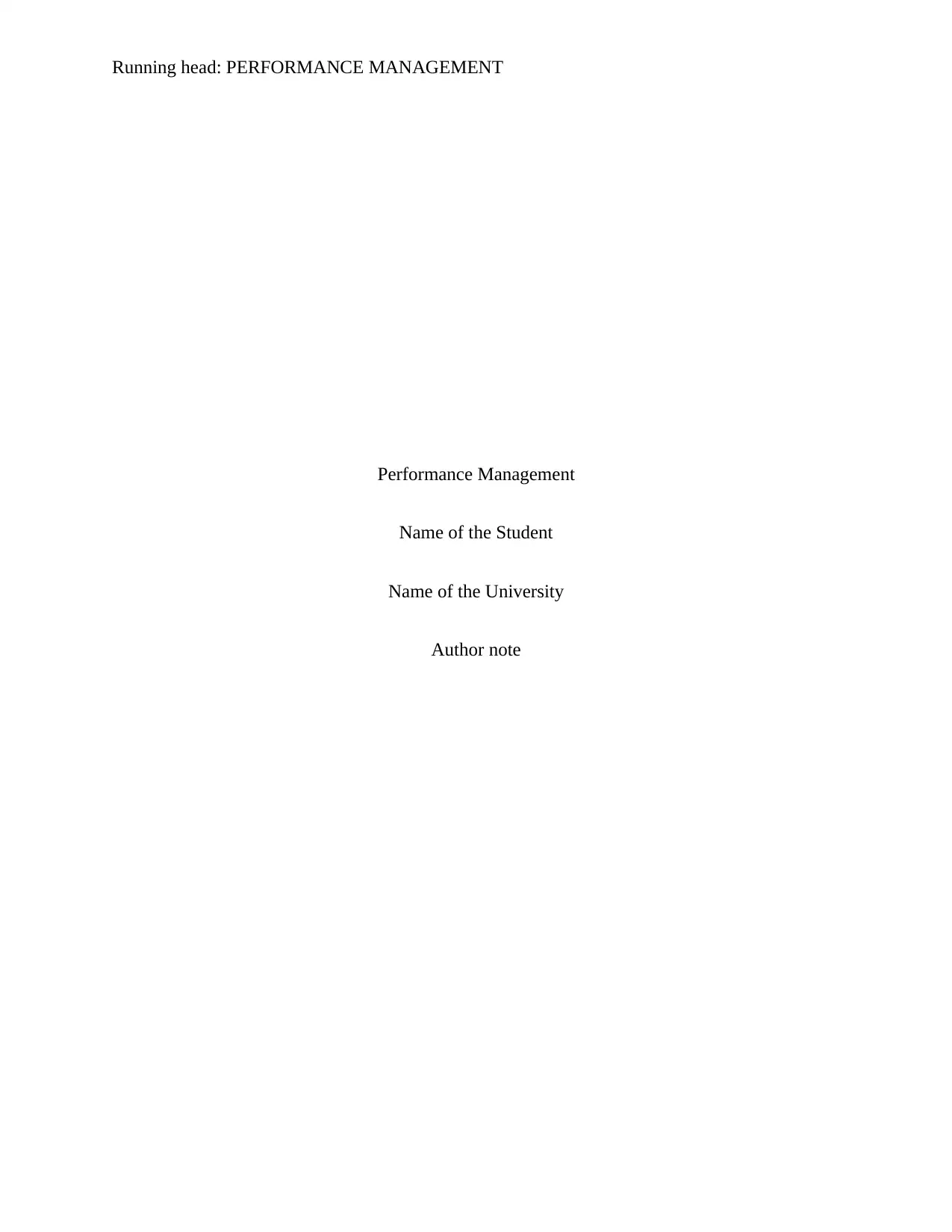
Running head: PERFORMANCE MANAGEMENT
Performance Management
Name of the Student
Name of the University
Author note
Performance Management
Name of the Student
Name of the University
Author note
Paraphrase This Document
Need a fresh take? Get an instant paraphrase of this document with our AI Paraphraser
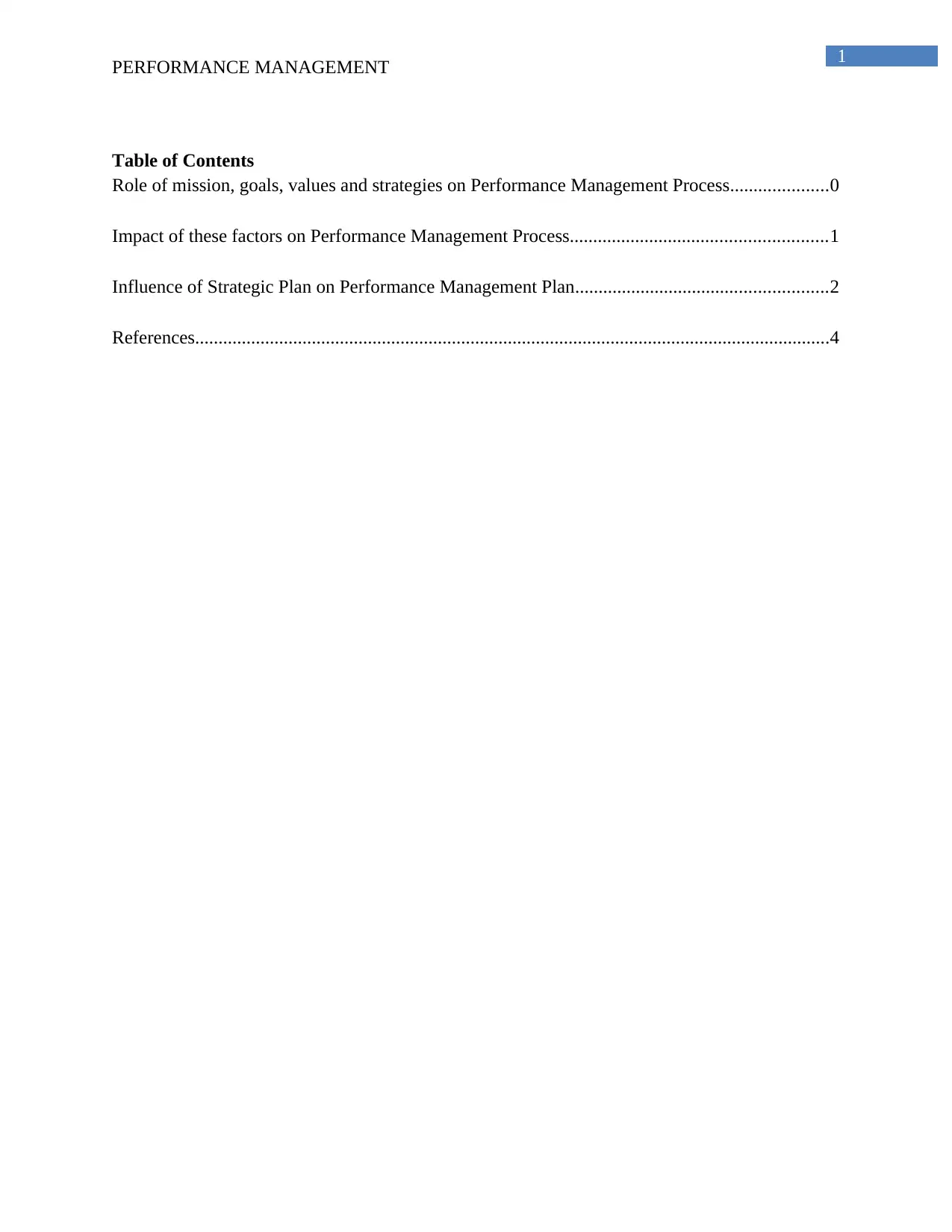
1
PERFORMANCE MANAGEMENT
Table of Contents
Role of mission, goals, values and strategies on Performance Management Process.....................0
Impact of these factors on Performance Management Process.......................................................1
Influence of Strategic Plan on Performance Management Plan......................................................2
References........................................................................................................................................4
PERFORMANCE MANAGEMENT
Table of Contents
Role of mission, goals, values and strategies on Performance Management Process.....................0
Impact of these factors on Performance Management Process.......................................................1
Influence of Strategic Plan on Performance Management Plan......................................................2
References........................................................................................................................................4
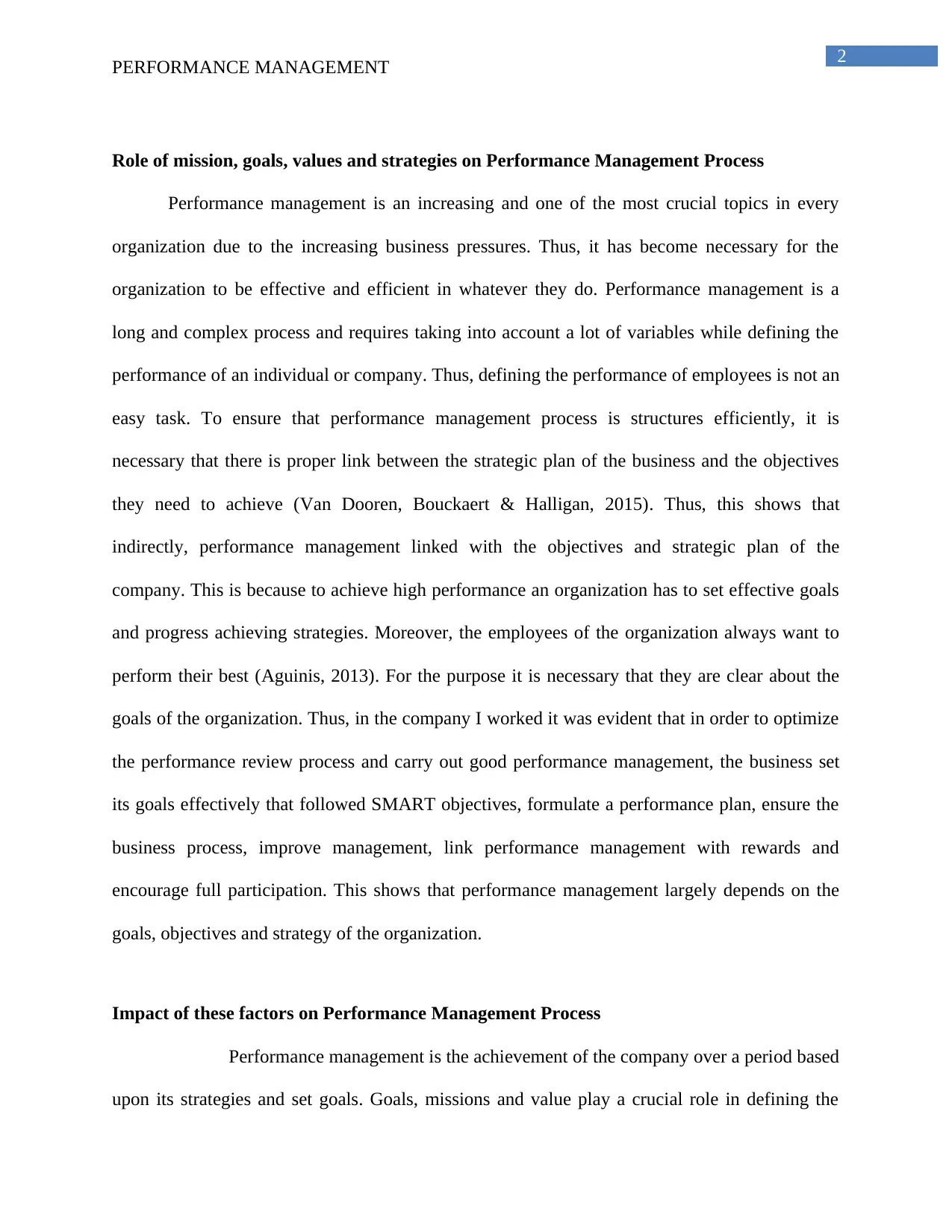
2
PERFORMANCE MANAGEMENT
Role of mission, goals, values and strategies on Performance Management Process
Performance management is an increasing and one of the most crucial topics in every
organization due to the increasing business pressures. Thus, it has become necessary for the
organization to be effective and efficient in whatever they do. Performance management is a
long and complex process and requires taking into account a lot of variables while defining the
performance of an individual or company. Thus, defining the performance of employees is not an
easy task. To ensure that performance management process is structures efficiently, it is
necessary that there is proper link between the strategic plan of the business and the objectives
they need to achieve (Van Dooren, Bouckaert & Halligan, 2015). Thus, this shows that
indirectly, performance management linked with the objectives and strategic plan of the
company. This is because to achieve high performance an organization has to set effective goals
and progress achieving strategies. Moreover, the employees of the organization always want to
perform their best (Aguinis, 2013). For the purpose it is necessary that they are clear about the
goals of the organization. Thus, in the company I worked it was evident that in order to optimize
the performance review process and carry out good performance management, the business set
its goals effectively that followed SMART objectives, formulate a performance plan, ensure the
business process, improve management, link performance management with rewards and
encourage full participation. This shows that performance management largely depends on the
goals, objectives and strategy of the organization.
Impact of these factors on Performance Management Process
Performance management is the achievement of the company over a period based
upon its strategies and set goals. Goals, missions and value play a crucial role in defining the
PERFORMANCE MANAGEMENT
Role of mission, goals, values and strategies on Performance Management Process
Performance management is an increasing and one of the most crucial topics in every
organization due to the increasing business pressures. Thus, it has become necessary for the
organization to be effective and efficient in whatever they do. Performance management is a
long and complex process and requires taking into account a lot of variables while defining the
performance of an individual or company. Thus, defining the performance of employees is not an
easy task. To ensure that performance management process is structures efficiently, it is
necessary that there is proper link between the strategic plan of the business and the objectives
they need to achieve (Van Dooren, Bouckaert & Halligan, 2015). Thus, this shows that
indirectly, performance management linked with the objectives and strategic plan of the
company. This is because to achieve high performance an organization has to set effective goals
and progress achieving strategies. Moreover, the employees of the organization always want to
perform their best (Aguinis, 2013). For the purpose it is necessary that they are clear about the
goals of the organization. Thus, in the company I worked it was evident that in order to optimize
the performance review process and carry out good performance management, the business set
its goals effectively that followed SMART objectives, formulate a performance plan, ensure the
business process, improve management, link performance management with rewards and
encourage full participation. This shows that performance management largely depends on the
goals, objectives and strategy of the organization.
Impact of these factors on Performance Management Process
Performance management is the achievement of the company over a period based
upon its strategies and set goals. Goals, missions and value play a crucial role in defining the
⊘ This is a preview!⊘
Do you want full access?
Subscribe today to unlock all pages.

Trusted by 1+ million students worldwide
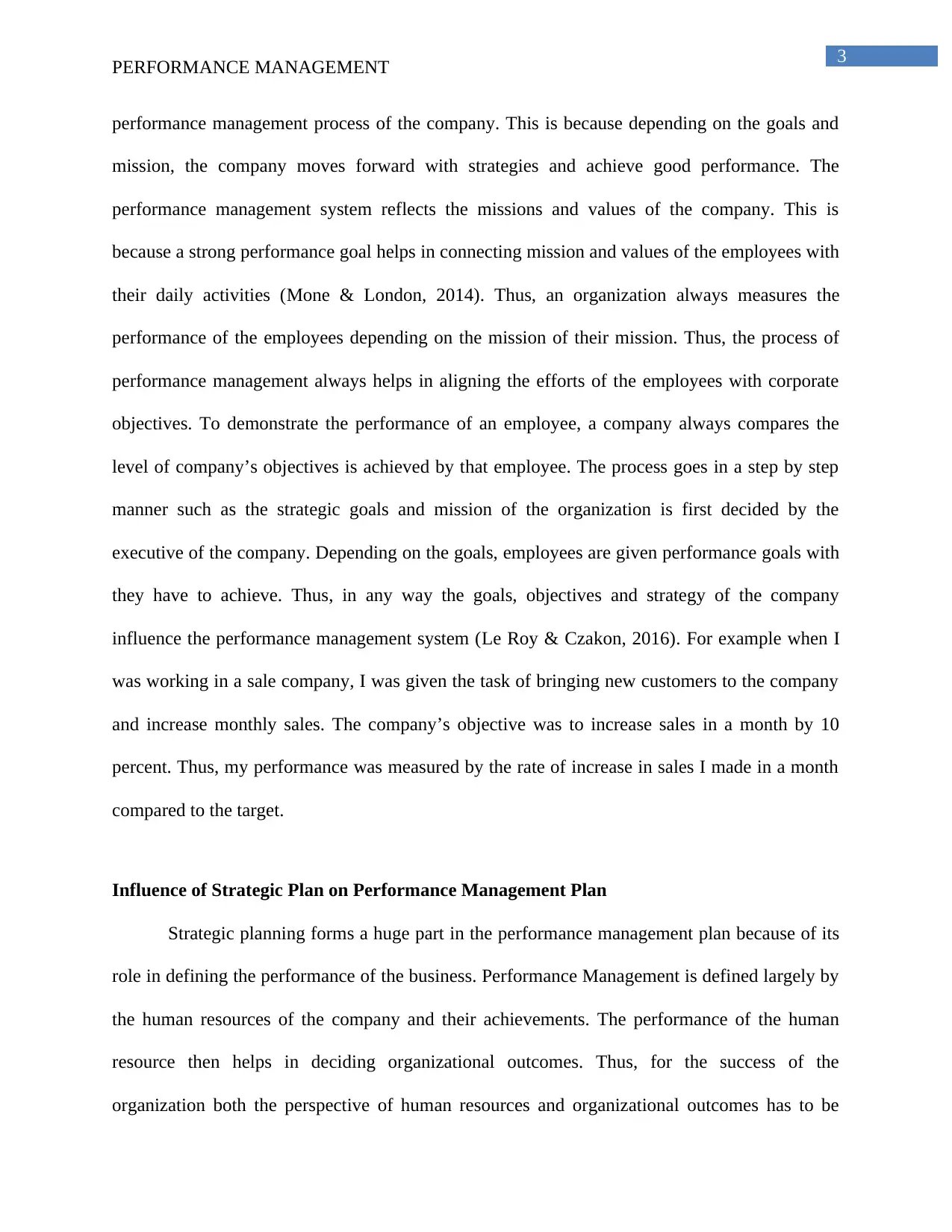
3
PERFORMANCE MANAGEMENT
performance management process of the company. This is because depending on the goals and
mission, the company moves forward with strategies and achieve good performance. The
performance management system reflects the missions and values of the company. This is
because a strong performance goal helps in connecting mission and values of the employees with
their daily activities (Mone & London, 2014). Thus, an organization always measures the
performance of the employees depending on the mission of their mission. Thus, the process of
performance management always helps in aligning the efforts of the employees with corporate
objectives. To demonstrate the performance of an employee, a company always compares the
level of company’s objectives is achieved by that employee. The process goes in a step by step
manner such as the strategic goals and mission of the organization is first decided by the
executive of the company. Depending on the goals, employees are given performance goals with
they have to achieve. Thus, in any way the goals, objectives and strategy of the company
influence the performance management system (Le Roy & Czakon, 2016). For example when I
was working in a sale company, I was given the task of bringing new customers to the company
and increase monthly sales. The company’s objective was to increase sales in a month by 10
percent. Thus, my performance was measured by the rate of increase in sales I made in a month
compared to the target.
Influence of Strategic Plan on Performance Management Plan
Strategic planning forms a huge part in the performance management plan because of its
role in defining the performance of the business. Performance Management is defined largely by
the human resources of the company and their achievements. The performance of the human
resource then helps in deciding organizational outcomes. Thus, for the success of the
organization both the perspective of human resources and organizational outcomes has to be
PERFORMANCE MANAGEMENT
performance management process of the company. This is because depending on the goals and
mission, the company moves forward with strategies and achieve good performance. The
performance management system reflects the missions and values of the company. This is
because a strong performance goal helps in connecting mission and values of the employees with
their daily activities (Mone & London, 2014). Thus, an organization always measures the
performance of the employees depending on the mission of their mission. Thus, the process of
performance management always helps in aligning the efforts of the employees with corporate
objectives. To demonstrate the performance of an employee, a company always compares the
level of company’s objectives is achieved by that employee. The process goes in a step by step
manner such as the strategic goals and mission of the organization is first decided by the
executive of the company. Depending on the goals, employees are given performance goals with
they have to achieve. Thus, in any way the goals, objectives and strategy of the company
influence the performance management system (Le Roy & Czakon, 2016). For example when I
was working in a sale company, I was given the task of bringing new customers to the company
and increase monthly sales. The company’s objective was to increase sales in a month by 10
percent. Thus, my performance was measured by the rate of increase in sales I made in a month
compared to the target.
Influence of Strategic Plan on Performance Management Plan
Strategic planning forms a huge part in the performance management plan because of its
role in defining the performance of the business. Performance Management is defined largely by
the human resources of the company and their achievements. The performance of the human
resource then helps in deciding organizational outcomes. Thus, for the success of the
organization both the perspective of human resources and organizational outcomes has to be
Paraphrase This Document
Need a fresh take? Get an instant paraphrase of this document with our AI Paraphraser
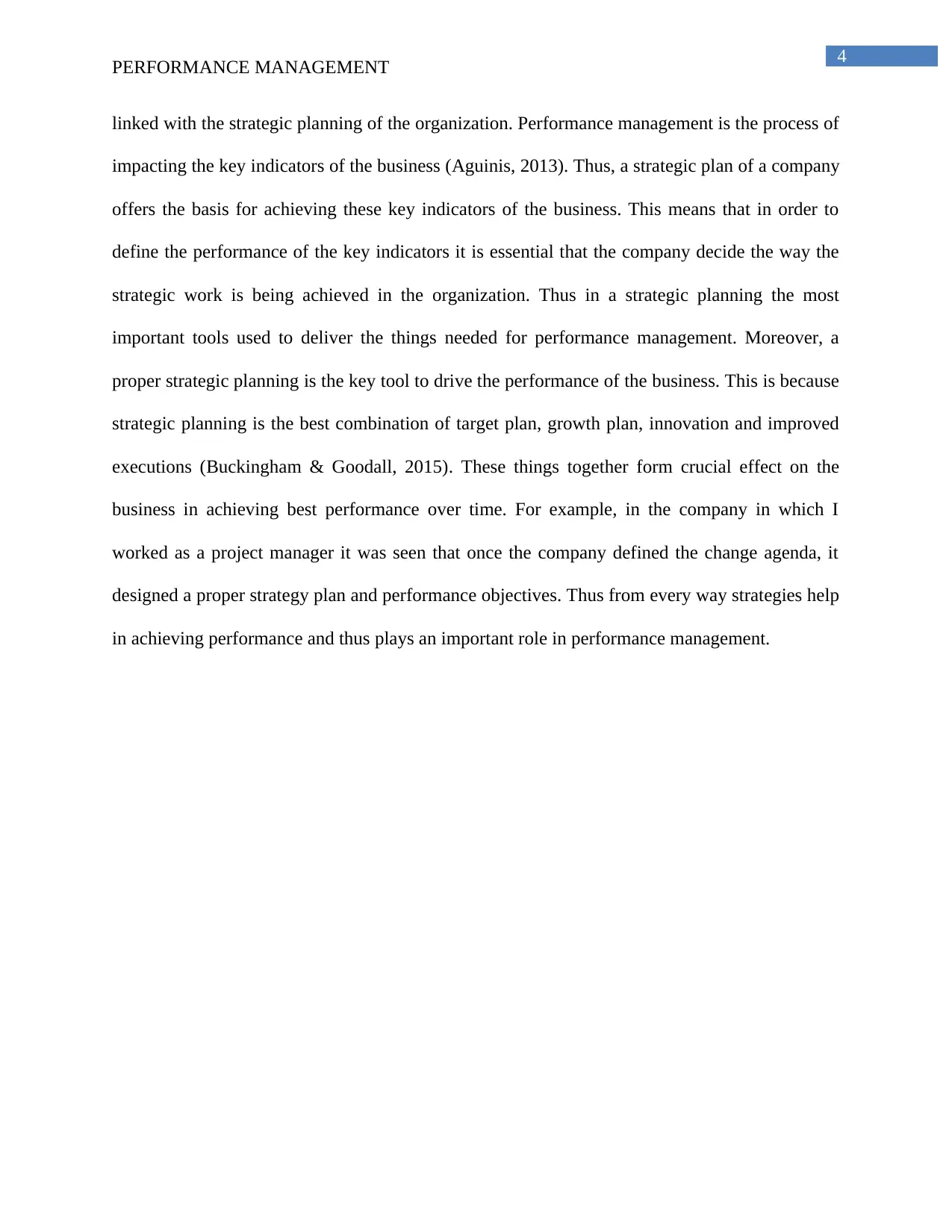
4
PERFORMANCE MANAGEMENT
linked with the strategic planning of the organization. Performance management is the process of
impacting the key indicators of the business (Aguinis, 2013). Thus, a strategic plan of a company
offers the basis for achieving these key indicators of the business. This means that in order to
define the performance of the key indicators it is essential that the company decide the way the
strategic work is being achieved in the organization. Thus in a strategic planning the most
important tools used to deliver the things needed for performance management. Moreover, a
proper strategic planning is the key tool to drive the performance of the business. This is because
strategic planning is the best combination of target plan, growth plan, innovation and improved
executions (Buckingham & Goodall, 2015). These things together form crucial effect on the
business in achieving best performance over time. For example, in the company in which I
worked as a project manager it was seen that once the company defined the change agenda, it
designed a proper strategy plan and performance objectives. Thus from every way strategies help
in achieving performance and thus plays an important role in performance management.
PERFORMANCE MANAGEMENT
linked with the strategic planning of the organization. Performance management is the process of
impacting the key indicators of the business (Aguinis, 2013). Thus, a strategic plan of a company
offers the basis for achieving these key indicators of the business. This means that in order to
define the performance of the key indicators it is essential that the company decide the way the
strategic work is being achieved in the organization. Thus in a strategic planning the most
important tools used to deliver the things needed for performance management. Moreover, a
proper strategic planning is the key tool to drive the performance of the business. This is because
strategic planning is the best combination of target plan, growth plan, innovation and improved
executions (Buckingham & Goodall, 2015). These things together form crucial effect on the
business in achieving best performance over time. For example, in the company in which I
worked as a project manager it was seen that once the company defined the change agenda, it
designed a proper strategy plan and performance objectives. Thus from every way strategies help
in achieving performance and thus plays an important role in performance management.
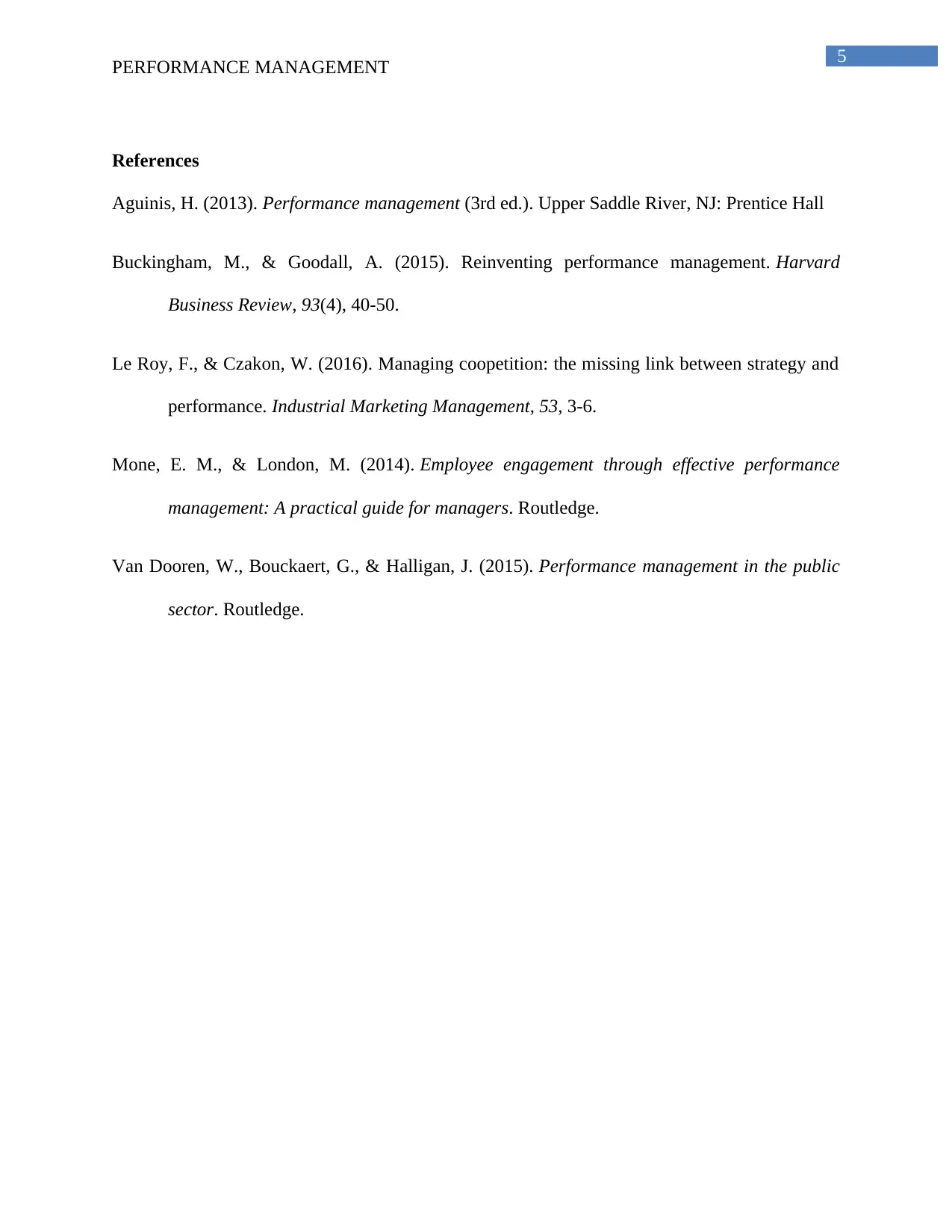
5
PERFORMANCE MANAGEMENT
References
Aguinis, H. (2013). Performance management (3rd ed.). Upper Saddle River, NJ: Prentice Hall
Buckingham, M., & Goodall, A. (2015). Reinventing performance management. Harvard
Business Review, 93(4), 40-50.
Le Roy, F., & Czakon, W. (2016). Managing coopetition: the missing link between strategy and
performance. Industrial Marketing Management, 53, 3-6.
Mone, E. M., & London, M. (2014). Employee engagement through effective performance
management: A practical guide for managers. Routledge.
Van Dooren, W., Bouckaert, G., & Halligan, J. (2015). Performance management in the public
sector. Routledge.
PERFORMANCE MANAGEMENT
References
Aguinis, H. (2013). Performance management (3rd ed.). Upper Saddle River, NJ: Prentice Hall
Buckingham, M., & Goodall, A. (2015). Reinventing performance management. Harvard
Business Review, 93(4), 40-50.
Le Roy, F., & Czakon, W. (2016). Managing coopetition: the missing link between strategy and
performance. Industrial Marketing Management, 53, 3-6.
Mone, E. M., & London, M. (2014). Employee engagement through effective performance
management: A practical guide for managers. Routledge.
Van Dooren, W., Bouckaert, G., & Halligan, J. (2015). Performance management in the public
sector. Routledge.
⊘ This is a preview!⊘
Do you want full access?
Subscribe today to unlock all pages.

Trusted by 1+ million students worldwide
1 out of 6
Related Documents
Your All-in-One AI-Powered Toolkit for Academic Success.
+13062052269
info@desklib.com
Available 24*7 on WhatsApp / Email
![[object Object]](/_next/static/media/star-bottom.7253800d.svg)
Unlock your academic potential
Copyright © 2020–2026 A2Z Services. All Rights Reserved. Developed and managed by ZUCOL.





